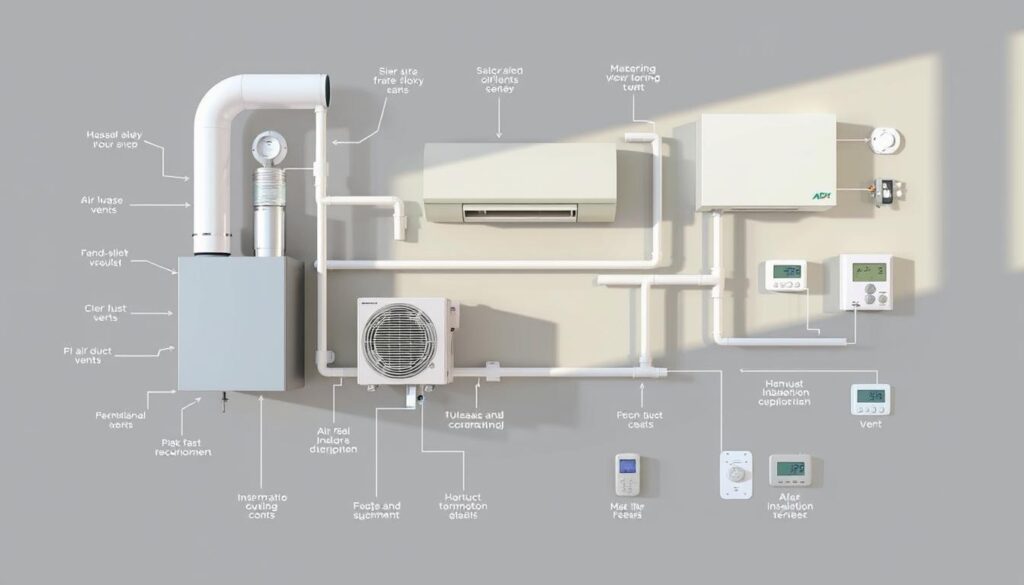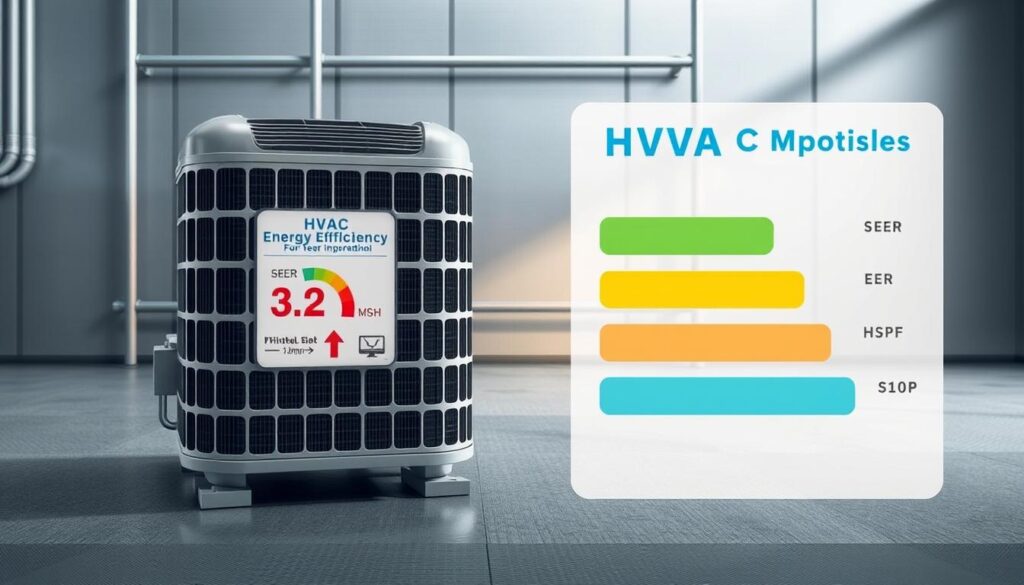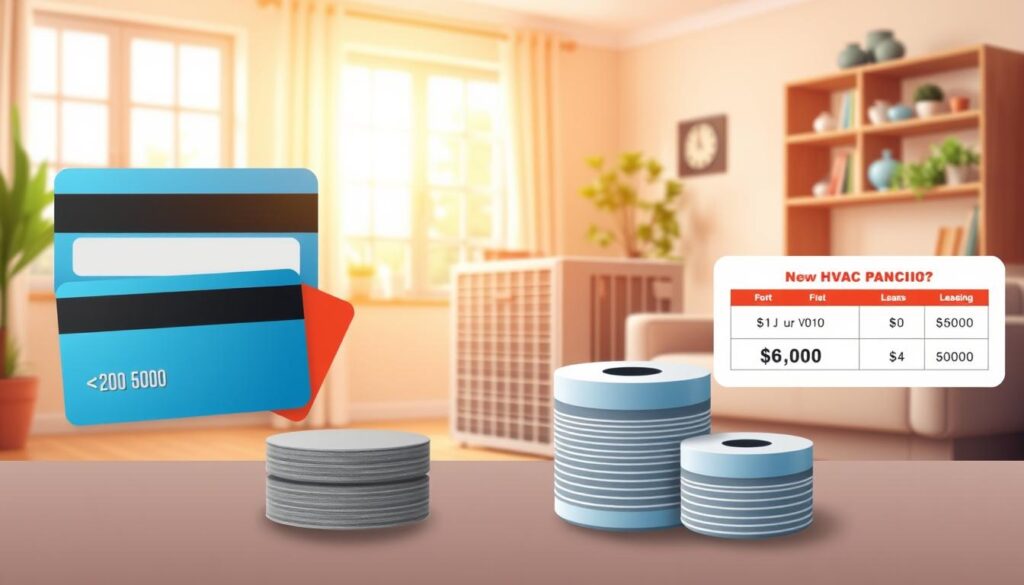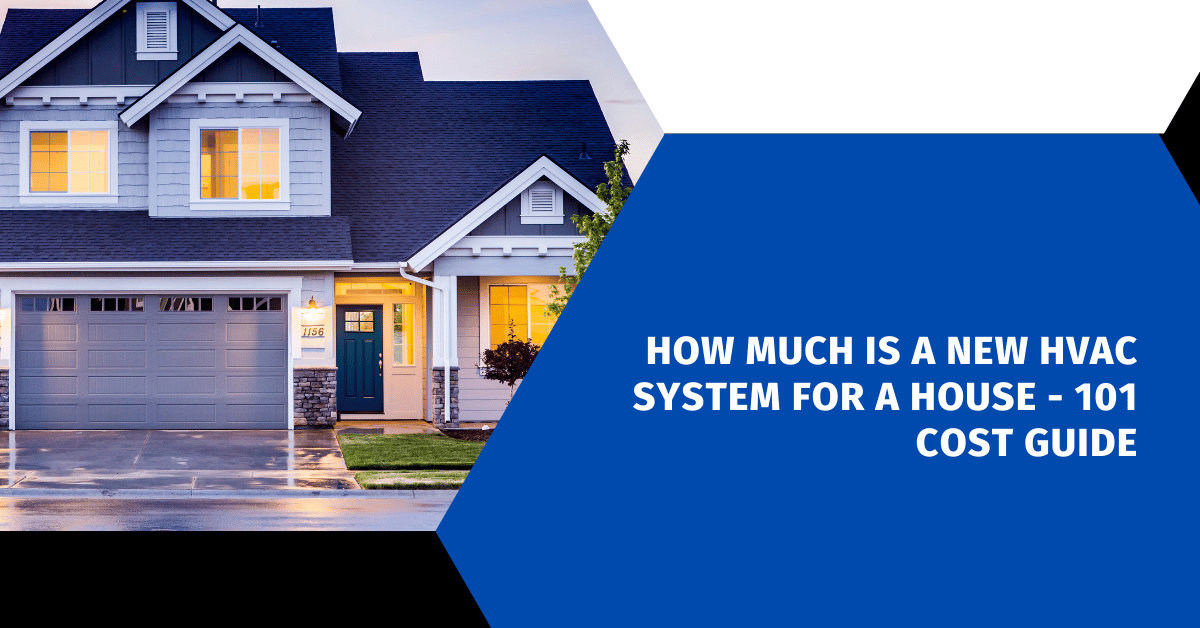Affiliate Disclosure
HVAC Guide Guys is a participant in the Amazon Services LLC Associates Program, an affiliate advertising program designed to provide a means for sites to earn advertising fees by advertising and linking to Amazon.
How Much Is a New HVAC System for a House? Ever wondered what it would cost to transform your home’s comfort with a brand-new HVAC system? Are you prepared to uncover the hidden expenses that could make or break your home comfort budget?

Installing a new HVAC system for your house is a significant investment. It can cost between $5,000 and $12,500. Understanding the true cost of HVAC installation requires diving deep into multiple factors that impact your overall expenses.
This guide will walk you through everything you need to know about the cost of a new HVAC system for a house. We’ll break down pricing, explore critical considerations, and help you make an informed decision. This decision will balance comfort and affordability.
Key Takeaways
- Average HVAC installation costs range between $5,000 and $12,500
- Multiple factors influence the total HVAC installation cost
- Energy efficiency can significantly impact long-term expenses
- Proper system sizing is key for optimal performance
- Professional installation ensures maximum system effectiveness
Table of Contents
Understanding HVAC System Basics and Costs Overview
Your home’s comfort relies on a complex system working hard behind the scenes. The HVAC system is key to your home’s climate control. It manages temperature, air quality, and humidity with great precision.
Residential HVAC system prices vary a lot. But knowing the basics helps you make smart choices about your home’s comfort.
What is an HVAC System?
An HVAC system does more than just control temperature. It’s a complex system of equipment that:
- Regulates indoor temperature
- Controls humidity levels
- Improves air quality
- Ensures consistent comfort throughout your home
Average Cost Ranges for New Systems
When looking at hvac replacement cost, prices differ based on system type and home size.
| System Type | Price Range | Coverage Area |
|---|---|---|
| Split System | $3,000 – $7,000 | 1,000-1,500 sq ft |
| Packaged System | $5,000 – $10,000 | 1,500-2,500 sq ft |
| Ductless Mini-Split | $2,000 – $5,000 | 500-1,000 sq ft |
Lifespan and Replacement Timing
Most HVAC systems last 10-15 years. Knowing when to replace yours can save on energy bills and avoid sudden breakdowns.
“Proactive maintenance is key to extending your HVAC system’s life and optimizing performance.” – HVAC Professional
Look out for these signs that it’s time for a new system:
- Frequent repairs
- Rising energy bills
- Inconsistent temperatures
- System age over 10 years
Understanding your residential hvac system prices and replacement needs helps you make smart choices about home comfort and energy efficiency.
Explore Our HVAC Shop
Looking for top-rated HVAC tools, parts, and accessories? Visit our shop and find the perfect solution for your needs.
Visit the ShopHow Much Is a New HVAC System for a House: Complete Price Breakdown
Knowing the cost of a new HVAC system helps you plan your home improvement budget. Prices vary based on several factors. The average cost for a new HVAC system is between $5,000 and $12,500, with most homeowners paying around $7,500.
When planning your HVAC investment, consider the costs of different units, installation, and extra equipment.
Costs by Unit Type
- Air Conditioner Units: Typically range from $3,000 to $7,000
- Furnace Systems: Prices between $2,500 and $6,000
- Heat Pump Systems: Cost approximately $4,000 to $8,000
Installation Labor Costs
Labor costs for HVAC installation are a big part of your total cost. Professional installation can be 30-40% of the total, costing $1,500 to $3,500.
Additional Equipment and Materials
You’ll also need to budget for extra parts:
- Ductwork modifications
- Thermostat replacement
- Electrical system upgrades
- Refrigerant lines
These extras can add $500 to $2,000 to your total cost. Always talk to a professional for the most accurate estimate for your home.
Explore Our HVAC Shop
Looking for top-rated HVAC tools, parts, and accessories? Visit our shop and find the perfect solution for your needs.
Visit the ShopFactors That Impact Your HVAC Installation Cost
When you look at hvac system quotes, you’ll see many things affect the price. Your home’s special features are key in figuring out how much a new HVAC system will cost.
Important things that change hvac replacement quotes include:
- Home Size and Layout: Bigger homes need stronger systems, which costs more
- Existing Ductwork Condition: If you can use old ducts, it saves money
- Energy Efficiency Ratings: Better SEER ratings cost more upfront but save money later
- Local Climate Demands: Harsh weather might mean you need a stronger HVAC
Your home’s size affects what HVAC system you need. A 1,500-square-foot home needs a different system than a 3,000-square-foot one. HVAC experts look at these details to give you a good quote.
How hard it is to install also matters. Hard layouts, multi-level homes, or big ductwork changes can raise costs. Planning well and getting expert advice can help manage these extra costs.
Understanding these factors can help you make a smart choice about your HVAC system replacement.
Size and Layout Considerations for HVAC Systems
Choosing the right HVAC system for your home is important. You need to think about your home’s size, layout, and how it’s built. Knowing these things helps you find affordable HVAC systems that fit your needs.
Square Footage Requirements
The size of your HVAC system depends on your home’s square footage. Contractors use a rule of thumb: about 20 BTUs per square foot. This means:
- Small homes (1,000 sq ft): Typically require 20,000-30,000 BTU systems
- Medium homes (1,500-2,000 sq ft): Need 30,000-40,000 BTU systems
- Large homes (2,500+ sq ft): May require multiple units or high-capacity systems
Home Construction Impact
Your home’s construction affects how well your HVAC system works. Important factors include:
- Insulation quality affects heat retention and cooling efficiency
- Window placement and type determine heat gain and loss
- Ceiling height impacts overall system requirements
Multi-Level Home Considerations
Multi-level homes have special HVAC needs. Each floor can have different temperatures. Zoned HVAC systems can help by creating separate zones for each level. This ensures even heating and cooling across your home.
Pro tip: Always consult with a professional HVAC technician to get the most accurate assessment for your specific home layout.
Ductwork Requirements and Associated Costs
Ductwork is key when figuring out the cost of a new HVAC system for your house. It’s like the circulatory system for your home’s heating and cooling. It helps spread air evenly across your living areas.
The cost of ductwork varies, from $15 to $20 per linear foot. Your final cost depends on a few important things:
- Home square footage
- Ductwork material selection
- Complexity of home layout
- Accessibility of existing ductwork
Different materials for ductwork affect the overall cost. Here’s a look at some common ones:
| Material Type | Cost per Linear Foot | Durability |
|---|---|---|
| Flexible Aluminum | $1.50 – $3.50 | Low |
| Rigid Sheet Metal | $4.50 – $7.50 | High |
| Fiberglass Duct Board | $2.00 – $4.00 | Medium |
If your home is tricky to work with, consider ductless mini-split systems. They can make installation easier and might save you money.
Getting a pro’s opinion is essential. A certified HVAC technician can give you accurate quotes and suggest the best ductwork for your home.
Explore Our HVAC Shop
Looking for top-rated HVAC tools, parts, and accessories? Visit our shop and find the perfect solution for your needs.
Visit the ShopEnergy Efficiency and SEER Ratings Impact on Price

When looking at residential HVAC system prices, knowing about energy efficiency is key. Your hvac replacement cost isn’t just the initial price. It also includes long-term costs of running the system.
Understanding SEER Values
SEER (Seasonal Energy Efficiency Ratio) is a key measure of HVAC system performance. It’s like a miles-per-gallon rating for your heating and cooling. Higher SEER ratings mean:
- More efficient energy use
- Lower utility bills
- Less harm to the environment
Cost vs. Energy Savings Analysis
Choosing a high-efficiency system might raise your initial hvac replacement cost. But, the long-term savings are big. A system with a higher SEER rating could save you 20-30% on yearly energy costs.
Energy Star Certification Benefits
Energy Star certified systems offer extra benefits for homeowners. These systems often have:
- Potential tax credits
- Manufacturer rebates
- Guarantees of better performance
“Efficiency isn’t an expense; it’s an investment in your home’s comfort and your financial future.”
By knowing about SEER ratings and energy efficiency, you can make a smart choice. This choice balances the initial cost with long-term savings.
Brand Comparison and Price Variations
When looking at home hvac unit prices, knowing the top manufacturers is key. Each brand offers something special that can change your new hvac system estimates.
Top HVAC brands have different features and prices. Your choice depends on your budget, what you need from the system, and how long you want it to last.
- Budget-Friendly Brands:
- Goodman: Known for affordable pricing
- Amana: Offers cost-effective options
- Bryant: Provides solid mid-range performance
- Premium Brands:
- Trane: Offers high-end reliability
- Carrier: Has advanced technological features
- Lennox: Focuses on superior energy efficiency
| Brand | Average Cost Range | Warranty Years |
|---|---|---|
| Goodman | $3,000-$5,000 | 10 Years |
| Trane | $5,000-$8,000 | 12-15 Years |
| Lennox | $6,000-$9,000 | 15-20 Years |
Your home’s setup, climate, and energy goals will help pick a brand. Talking to a professional HVAC technician can help you make the right choice.
While the initial cost is important, think about long-term performance and energy savings. These should be your main concerns when choosing an HVAC system.
Explore Our HVAC Shop
Looking for top-rated HVAC tools, parts, and accessories? Visit our shop and find the perfect solution for your needs.
Visit the ShopHVAC Financing Options and Payment Plans
Buying a new HVAC system is a big deal for homeowners. Knowing your financing options can make it easier to afford. There are many ways to pay for your new HVAC system over time.

Homeowners have several financing paths to explore when considering an HVAC system upgrade:
- Home Equity Loans
- Personal Financing
- Manufacturer Payment Plans
- Government Incentive Programs
Home Equity Financing Solutions
Home equity loans and HELOCs are great options. They usually have lower interest rates than personal loans. You can use your home’s equity to pay for a new HVAC system.
Personal Loan and Company Financing
Many HVAC companies work with banks to offer financing. Personal loans from banks or credit unions can be quick and flexible. Some manufacturers even offer zero-interest financing for certain customers.
Tax Credits and Rebates
Energy-efficient HVAC systems might get you tax credits and rebates. The government and local utilities offer financial help for these systems. These can greatly lower your costs.
Pro Tip: Always compare multiple hvac system quotes and explore different financing options to find the best deal for your budget.
With careful research and planning, your HVAC investment can be a smart home improvement. It won’t feel like a financial strain.
Conclusion
Getting a new HVAC system is a big deal for your home’s comfort and saving energy. When looking at hvac installation quotes, think about more than just the cost. The right system affects your comfort, energy use, and bills for years to come.
ENERGY STAR says you should replace your HVAC every 10 to 15 years. This keeps you up-to-date with the latest, affordable HVAC systems. New systems are more efficient, cut down on energy costs, and make your home more comfortable than old ones.
Doing your homework and planning carefully really matters. Think about the type of system, your home’s size, energy ratings, and who installs it. Getting different quotes, knowing about financing, and keeping up with maintenance will help your investment last longer and work better.
By choosing wisely for your HVAC, you’ll make your home more comfy and energy-smart. Don’t hurry—think about what you need, your budget, and your future goals. This way, you’ll find the best HVAC system for your home.

